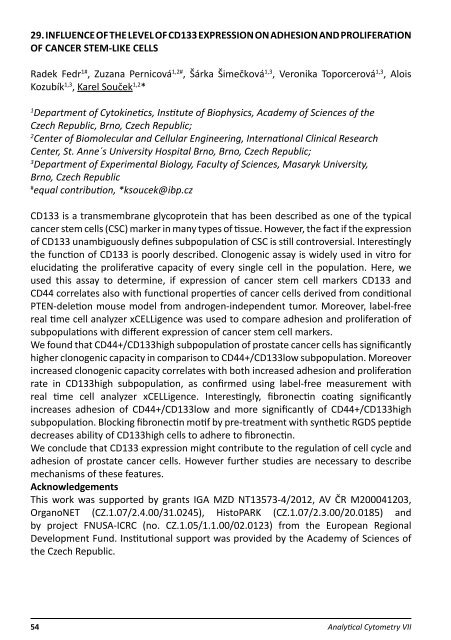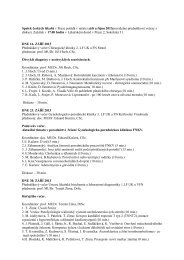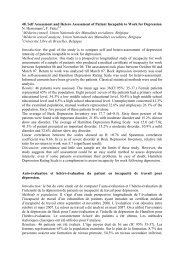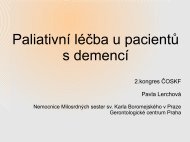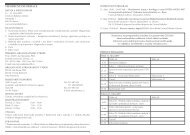ABSTRACTS â ORAL PRESENTATIONS - AMCA, spol. s r.o.
ABSTRACTS â ORAL PRESENTATIONS - AMCA, spol. s r.o.
ABSTRACTS â ORAL PRESENTATIONS - AMCA, spol. s r.o.
You also want an ePaper? Increase the reach of your titles
YUMPU automatically turns print PDFs into web optimized ePapers that Google loves.
29. INFLUENCE OF THE LEVEL OF CD133 EXPRESSION ON ADHESION AND PROLIFERATION<br />
OF CANCER STEM-LIKE CELLS<br />
Radek Fedr 1# , Zuzana Pernicová 1,2# , Šárka Šimečková 1,3 , Veronika Toporcerová 1,3 , Alois<br />
Kozubík 1,3 , Karel Souček 1,2 *<br />
1<br />
Department of Cytokinetics, Institute of Biophysics, Academy of Sciences of the<br />
Czech Republic, Brno, Czech Republic;<br />
2<br />
Center of Biomolecular and Cellular Engineering, International Clinical Research<br />
Center, St. Anne´s University Hospital Brno, Brno, Czech Republic;<br />
3<br />
Department of Experimental Biology, Faculty of Sciences, Masaryk University,<br />
Brno, Czech Republic<br />
#<br />
equal contribution, *ksoucek@ibp.cz<br />
CD133 is a transmembrane glycoprotein that has been described as one of the typical<br />
cancer stem cells (CSC) marker in many types of tissue. However, the fact if the expression<br />
of CD133 unambiguously defines subpopulation of CSC is still controversial. Interestingly<br />
the function of CD133 is poorly described. Clonogenic assay is widely used in vitro for<br />
elucidating the proliferative capacity of every single cell in the population. Here, we<br />
used this assay to determine, if expression of cancer stem cell markers CD133 and<br />
CD44 correlates also with functional properties of cancer cells derived from conditional<br />
PTEN-deletion mouse model from androgen-independent tumor. Moreover, label-free<br />
real time cell analyzer xCELLigence was used to compare adhesion and proliferation of<br />
subpopulations with different expression of cancer stem cell markers.<br />
We found that CD44+/CD133high subpopulation of prostate cancer cells has significantly<br />
higher clonogenic capacity in comparison to CD44+/CD133low subpopulation. Moreover<br />
increased clonogenic capacity correlates with both increased adhesion and proliferation<br />
rate in CD133high subpopulation, as confirmed using label-free measurement with<br />
real time cell analyzer xCELLigence. Interestingly, fibronectin coating significantly<br />
increases adhesion of CD44+/CD133low and more significantly of CD44+/CD133high<br />
subpopulation. Blocking fibronectin motif by pre-treatment with synthetic RGDS peptide<br />
decreases ability of CD133high cells to adhere to fibronectin.<br />
We conclude that CD133 expression might contribute to the regulation of cell cycle and<br />
adhesion of prostate cancer cells. However further studies are necessary to describe<br />
mechanisms of these features.<br />
Acknowledgements<br />
This work was supported by grants IGA MZD NT13573-4/2012, AV ČR M200041203,<br />
OrganoNET (CZ.1.07/2.4.00/31.0245), HistoPARK (CZ.1.07/2.3.00/20.0185) and<br />
by project FNUSA-ICRC (no. CZ.1.05/1.1.00/02.0123) from the European Regional<br />
Development Fund. Institutional support was provided by the Academy of Sciences of<br />
the Czech Republic.<br />
54 Analytical Cytometry VII


